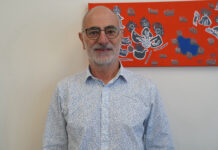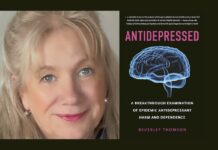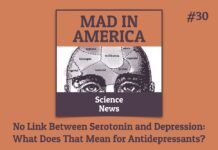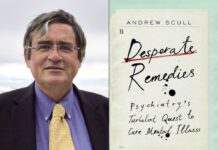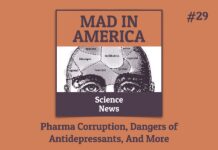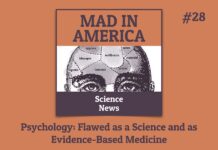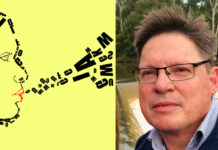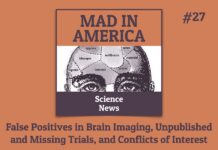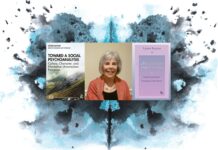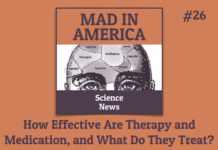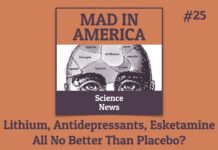Is Service-User Research Possible in Mental Health? An Interview with Diana Rose
MIA’s Ayurdhi Dhar interviews Diana Rose about producing knowledge with survivors of psychiatry, abuses faced by service users, and what good research would look like.
Jon Jureidini–Evidence-Based Medicine in a Post-Truth World
In this interview, Jon Jureidini talks about the issues with evidence-based medicine and describes what led to the debasement of a system originally conceived to challenge extravagant claims and poor science.
Beverley Thomson–Antidepressed: Antidepressant Harm and Dependence
We talk with author Beverley Thomson about her latest book, entitled Antidepressed: A Breakthrough Examination of Epidemic Antidepressant Harm and Dependence.
John Read and Jeffrey Masson – Biological Psychiatry and the Mass Murder of “Schizophrenics”
On the Mad in America podcast this week, we hear from the co-authors of a paper published in the journal Ethical Human Psychology and...
No Link Between Serotonin and Depression: What Does That Mean for Antidepressants?
Peter Simons covers in detail a new systematic review that debunks the widely popularized myth of low serotonin in depression, the “chemical imbalance theory.”
How Grief Became a Disorder and What This Means About Us: An Interview with...
MIA’s Zenobia Morrill interviews psychologist Kaori Wada about what the creation of Prolonged Grief Disorder reveals about our culture and the current status of psychology.
Andrew Scull—Desperate Remedies: Psychiatry’s Turbulent Quest to Cure Mental Illness
Sociologist and author Andrew Scull discusses the history of psychiatry's "Desperate Remedies," from lobotomy and the asylum to the failures of today's drugs and the fads of ketamine and deep brain stimulation.
“Pollution’s Mental Toll”: A Talk with Journalist Kristina Marusic
The reporter explains how air and water pollution affect our brains, why children are so vulnerable, and what to do about it.
Pathologized Since Eve: Jessica Taylor on Women, Trauma, and “Sexy but Psycho”
Our guest today is Jessica Taylor, author of Sexy But Psycho: How the Patriarchy Uses Women’s Trauma Against Them, which was published in March...
Jock McLaren – The Biopsychosocial Model is a Mirage, Time for a Biocognitive Model?
Dr. Niall McLaren joins us to talk of his experiences working in Australian psychiatry and explains why the models that purport to guide psychiatric diagnosis and treatment are not what they seem.
Tara Thiagarajan: Mental Well-being Better in Venezuela than in United States: Why?
Tara Thiagarajan is founder and chief scientist of Sapien Labs, a nonprofit organization that runs the Mental Health Million Project, we discuss its annual Mental State of the World Report, which uses an online survey to track mental wellbeing among internet-enabled populations around the world.
Pharma Corruption, Dangers of Antidepressants, And More
Peter Simons covers news on mental health app Cerebral and pharma companies Biogen and Cassava; how social media influencers are the new pharma marketers; studies that found antidepressants don't improve quality of life and are harmful to the fetus when pregnant women take them; benzo withdrawal; and more!
The Failings of “Mental Health”: How a Seemingly Benign Concept Might be Dangerous
MIA’s Ayurdhi Dhar interviews Bruce Cohen about dismissive psychiatrists, pervasive psychiatry, and the field's ties to neoliberal capitalism.
New Tools to Support New Moms: An Interview with Jennifer Barkin, PhD
A maternal mental health expert shares how perinatal stress and the climate crisis are affecting women’s everyday lives.
Bringing Integrative Community Therapy to Pittsburgh: An Interview with Alice and Kenneth Thompson
Father and daughter Ken and Alice Thompson run the Visible Hands Collaborative, bringing Integrative Community Therapy to the US.
Psychology: Flawed as a Science and as Evidence-Based Medicine
Peter Simons covers a paper arguing that “psychology is fundamentally incompatible with hypothesis-driven theoretical science,” another paper finding that evidence-based medicine is more corporate gimmick than reliable science, a study that found psychiatrists deliver the worst-quality healthcare of any medical specialty, and more!
Trans Lifeline: Naming Trans-Specific Harm in Mental Health
Interim Hotline Manager Jahmil Roberts and Advocacy Director Yana Calou from the Trans Lifeline work towards connecting trans people to the community support and resources they need to survive and thrive - free of prisons and police
Psych Concepts Creep Into Our Everyday Experiences: An Interview with Nicholas Haslam
MIA’s Ayurdhi Dhar interviews Nicholas Haslam about how psychiatric terms get diluted and creep into everyday language, altering our experiences.
False Positives in Brain Imaging, Unpublished and Missing Trials, and Conflicts of Interest
In our Science News podcast, Peter Simons reports on false positives in brain imaging, unpublished and missing trials, conflicts of interest and more.
The Impact the DSM Has Had On All of Us: An interview with Sarah...
"You're not going to sell many drugs by saying your problem is your life experiences. It's far more effective to say your problem is in the brain. It's an imbalance, we can correct that imbalance, just take our product."
Trusting People as Experts of Themselves: Sera Davidow on the Wildflower Peer Support Line
Sera Davidow is a filmmaker, activist, advocate, author, and mother of two very busy kids. As a survivor of physical, sexual, and emotional abuse...
The Social Unconscious and Character Formation in Neoliberal Culture: An Interview with Lynne Layton
MIA’s Javier Rizo interviews Lynne Layton about social psychoanalysis and how normative unconscious processes can help illuminate how oppressive systems get internalized and reproduced.
How Effective Are Therapy and Medication, and What Do They Treat?
In our science news podcast, Peter Simons covers a study that found both therapy and medication to have very limited effectiveness.
The Medicalization of Women’s Suffering: An Interview with Dana Becker
MIA’s Ayurdhi Dhar interviews Dana Becker about how therapeutic culture fails to adequately address women’s suffering.
Lithium, Antidepressants, Esketamine—All No Better Than Placebo?
Peter Simons covers a clinical trial that found lithium ineffective at preventing suicide attempts, an essay by Allen Frances on the overdiagnosis of depression and overprescription of antidepressants, a review of the ineffectiveness and dangers of antidepressants, and an analysis that revealed that esketamine failed five of its six clinical trials.


